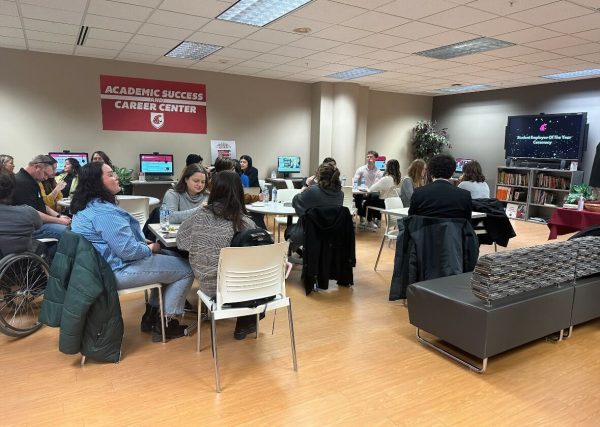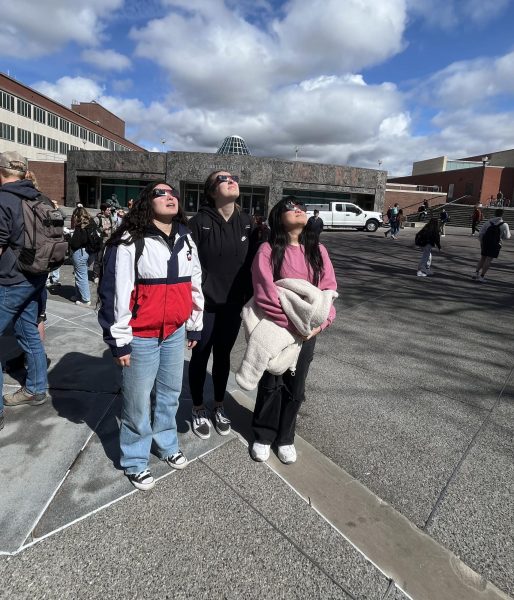WSU loosens free speech regulations
October 17, 2016
When WSU student Elsie Cree wanted to lead a demonstration last month, the junior bypassed WSU’s permit system. Although this process is no longer required, few are aware of the change.
“We just showed up,” said Cree, who demonstrated in solidarity with those protesting the Dakota Access Pipeline. “I have a lot of issues with the free speech on campus because we are really not allowed to show up and we did. I don’t like talking about it because it’s an issue where if you are going to go through a process, you have to go through approval and all these other things and I don’t think it’s right.”
Long a topic of conversation at universities, free speech codes and zones have been brought to the forefront at WSU after they were revised prior to the 2016-2017 school year to make it easier for students to protest.
University regulations once required students to protest in specific zones and give prior notice to the Office of Student Involvement. The Washington Administrative Code (WAC) now only requests prior notice for free speech activities.
Despite the recent changes to the WAC, students and administrators alike remain unaware of the new adjustments, which have granted students more protection under the first amendment.
This past spring, the Board of Regents approved changes to the code that eliminated the definition of the free speech zone as the steps of Todd Hall and now only request a two-week notice and application.
If students choose to follow the requested application process, they receive support from the university in the form of police presence and facility amenities. When they notify the Office of Student Involvement, assistant director of student involvement Berto Cerrillo takes the application and ensures all the necessary groups are contacted.
Cerrillo acts as a middleman between the students and university and community officials.
“My big concern is people’s safety and liability issues are clear with what our institutional policy is,” Cerrillo said. “But I know that at WSU, people are very sensitive to the free speech issue. I want to make sure we aren’t getting in the way of it.”
Students no longer have to apply; but some, like Cree, are not aware of that, creating friction in the already charged environment of free speech.
Later this month, the university’s newly loosened policies may face a challenge as the WSU College Republicans plan to build a mock Trump wall as part of a demonstration on immigration policy. Several other student and community groups are planning a Unity Rally in response to advocate for peace and awareness, according to the group’s Facebook page.
A GoFundMe page created on October 10 by James Allsup, president of the College Republicans, said the demonstration will also be about “free speech on campus” because “many have tried to shut down or censor WSU CR’s right to demonstrate.”
Laura Beltz, a program officer with the Policy Reform Project at the Foundation for Individual Rights in Education (FIRE), said because the Trump wall demonstration is fostering conversation on both sides, it is the perfect example of free speech in action.
“That’s exactly what is so great about free speech,” she said, “that you have this exchange of ideas and that when ideas aren’t silenced, you can actually challenge them.”
WSU President Kirk Schulz sent a statement to all students on Oct. 4 outlining WSU’s policies on free speech, noting the importance of diversity and the ability of free speech and safe spaces to coexist. It implores students to disagree with tact and kindness, while encouraging them to speak out and utilize their right to free speech.
Daniel Records, affirmative action and equal employment opportunity coordinator in the Office of Equal Opportunity, said the most difficult part of free speech issues is balancing students’ safety with their First Amendment rights.
“My view, as an administrator, is free speech is really the cornerstone of an institution of higher education,” Records said. “We can’t exist without it. We are doing our students and the community a disservice when we try to prevent people from sharing their ideas.”
Just before school started, the University of Chicago wrote a letter to the student body saying it would not require its institution to give trigger warnings or provide safe spaces. With the polarization of this election season, the balance between maintaining free speech and ensuring that individuals are not victimized becomes all the more nuanced.
“We have a right to be able to pursue our education and work in an environment that’s free from harassment, but that doesn’t mean that we can be shielded from offense all the time,” Records said.





















